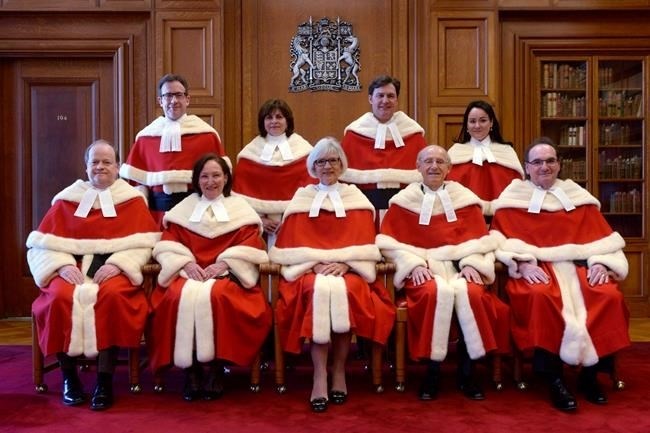
The Supreme Court justices pose for a group photo during the official welcoming ceremony for Supreme Court of Canada Justice Suzanne Cote at the Supreme Court, Tuesday Feb. 10, 2015 in Ottawa. Do you want to be a Supreme Court justice? You may have a chance at a seat on the high court if you meet the requirements and criteria to be used in the new selection process.
Image Credit: THE CANADIAN PRESS/Adrian Wyld
August 02, 2016 - 9:00 PM
OTTAWA - Do you want to be a Supreme Court justice? You may have a chance at a seat on the high court if you meet the requirements and criteria to be used in the new selection process. If you do, apply before the deadline of Aug. 24:
1) First, you have to be a judge or a lawyer. The Constitution says to be eligible for appointment to the Supreme Court of Canada, a candidate has to be a current or former judge of a provincial superior or appeals court, or be a current or former lawyer with 10 years standing at the bar of a province. So if you're neither a judge nor a lawyer, you're better off applying for a Senate seat.
2) Any new Supreme Court justice has to be functionally bilingual. A new justice will be expected to read submissions as well as take part in oral arguments without the need for translation help.
3) Candidates have to have a "demonstrated superior knowledge" of Canadian law, shown through specialized training or scholarly writing. Bonus points for having knowledge of Quebec civil law and indigenous legal traditions.
4) Critical thinking skills are a must. Candidates need to have "superior analytical skills," the ability to "resolve complex legal problems" and synthesize a large of amount of information about the social context around legal disputes, including being "be sensitive to changes in social values relating to the subject matter of cases before the Supreme Court." They need to show they can take all this, put it into writing — excellent writing, nothing less — and do all the work "under significant time pressures."
5) Constitutional, linguistic and professional qualifications aside, what are you like as a person? Are you a beacon of moral integrity? Show respect and considerations for others? Are your views diverse, "neither too narrow nor resistant to change"? Do you have the intestinal fortitude to make decisions at odds with the government, public opinion or your own colleagues? Can you keep deliberations secret? And can you set aside your own opinions to measure the evidence "fairly and impartially"? If you answered yes to all of those questions, you pass this part of the test.
6) Now the last part: The needs of the court itself. Candidates will be evaluated on how well they help the court deal with constitutional and charter cases, whether their legal expertise fills a void among the justices and whether they help the Liberals achieve gender parity and diversity on the high court.
News from © The Canadian Press, 2016